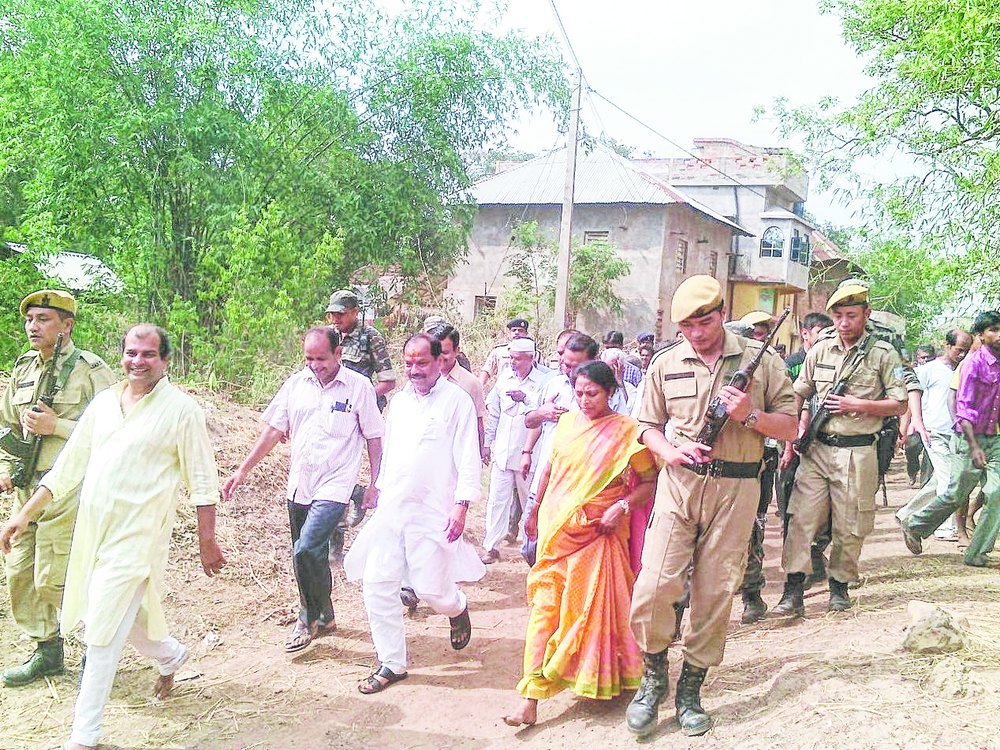
Maluti (Dumka), May 24: Chief minister Raghubar Das, who spent last night in Maluti, the historical terracotta temple hub in Dumka district, brought along with him the flurry of a VVIP visit that the neglected village is unaccustomed to.
The chief minister's dust-raising convoy last evening, public meetings yesterday and sightseeing-cum- puja today, his somewhat fantastic promise of zero power cuts by June-end and the buzz of spiritual tourism connecting Maluti, Basukinath and Deoghar left the sleepy village shaken and stirred, but sceptical.
Das, who wanted his ministerial colleagues to spend a night at a village panchayat to get a feel of ground realities and government schemes, had chosen Maluti, 60km away from Dumka district headquarters, as his destination, citing "spiritual reasons".
But the problems that emerged at meetings and a janata durbar - a gathering of 2,000 para-teachers and a janata durbar of around 300 villagers last night, and a smaller meeting with 50 villagers this morning - were distinctly non-spiritual.
Though Maluti village has electricity, it hardly gets power. And, because it hardly gets power, pumping water is a luxury. Also, the village has one middle school but children of this Bengali-dominated village hardly go there, because classroom teaching, on the rare occasions that it happens, is not in their native tongue. Para-teachers - the mainstay of schooling in the hinterland - are poorly paid.
Sometime between 1680 and 1760, then zamindar Basant Roy and his family had constructed 108 terracotta temples in Maluti for Hindu gods and goddesses, with intricate designs.
In the absence of restoration, many temples have crumbled, leaving only 72 today.
India came to know about Maluti's terracotta relics probably this Republic Day, when a tableau modelled on its temples rolled out on Rajpath, New Delhi, earning the state government second spot. Though Maluti has international tourism potential, temples are not maintained, infrastructure around them is almost non-existent. Jharkhand tourism department's only contribution seems to be a small guesthouse. In the absence of regular power supply, life ends with sunset.
For almost everything, Maluti relies on Bengal's Birbhum district, a stone's throw away, its Rampurhat station only 18km from this temple village. From schools and colleges to healthcare to even cellphone connections, Birbhum is the go-to address for Maluti.
If Das is aware that Maluti seems almost off Jharkhand's administrative map, he did not show it during this trip.
For the first-ever night stay by a chief minister - predecessors Babulal Marandi and Arjun Munda visited Maluti but did not stay overnight - Dumka administration did its best, repairing a 5km approach road, fitting generators and an AC at the tourism building where Das was put up. Last evening, six solar lamps on the roadside tried to keep darkness at bay while inside the tourism guesthouse, diesel-operated generators constantly spewed black smoke to keep the chief minister in comfort.
Stressing on Maluti's spirituality, Das insisted he would not entertain any tough questions. "Only positive questions, only positive questions. Don't create negativity. I have a plan of forming a religious corridor in Santhal Pargana covering Deoghar, Basukinath and Maluti," he said last evening.
"The state government has decided all ministers would make a night stay at a village once every month. I picked Maluti for spiritual reasons. Has any CM stayed in Maluti?" Das asked.
Without going into specifics, he promised Maluti would be a "zero power cut village latest by the end of June". There will be power substation in the village, he added.
When around 2,000 para-teachers reminded Das that neighbouring Chhattisgarh pays better, Das said: "Teachers are meant to teach students. I am sympathetic to your demands. (But) Chhattisgarh is a rich state so it has better pay prospects. Jharkhand is a poor state."
Das also assured the Bengali-dominated village that the school would soon have Bangla as the medium of instruction and promised to appoint Bengali teachers "soon". Again, he did not specify how.
Across river Chandan, barely 100 metres away from Maluti, is Dharampur in Bengal. It glows with neon bulbs and mast lights.
"The CMs who last visited us (Marandi and Munda) had granted some solar lights and some words of solace. Let's see what the new CM does for us," para-teacher Ajoy Choudhary told The Telegraph later as high-mast lights winked from Bengal.
"Bengal always has lights, we are in almost-perpetual darkness," added villager Utpal Roy.
Retired teacher Gopaldas Mukherjee (85), who has devoted his life to the conservation of Maluti temples and written several books on the subject, tried to meet Das last evening but could not. "I watch these historical monuments crumble every day. First and foremost, these temples need conservation. Then, everything, including the local economy's revival, will happen on its own. Some tourists do come, but there is no encouragement from the government."
"Maluti is basically a case study of state malnourishment," said resident Jayanta Ghoshal. "Good the CM is here, but such visits make no difference to our life."
After the morning puja, a public meeting and sightseeing of temples, Das left Maluti for Dumka district headquarters at 11am today.










